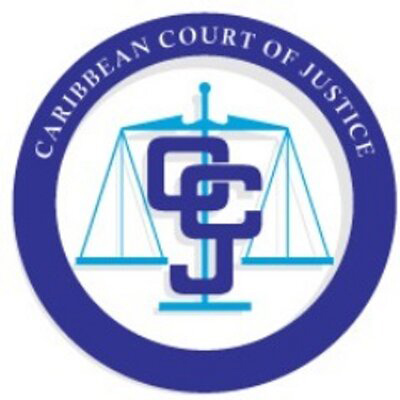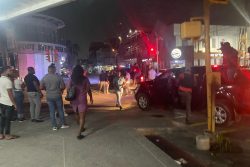The Caribbean Court of Justice (CCJ) has issued an order that restrains the Guyana Elections Com-mission (GECOM) from declaring the results of the March 2nd polls, following an approach by the opposition People’s Progressive Party/Civic (PPP/C) to challenge Monday’s ruling by Guyana’s Court of Appeal on the constitutional meaning of “votes cast” at the March 2 polls.
Ahead of a full hearing on the dispute, which could impact the final declaration of the results of the polls, the CCJ yesterday issued an order requiring GECOM and its officers and agents “to take no step to prejudice the fair hearing of an Application made to the Court by Mohammed Irfaan Ali and Bharrat Jagdeo.”
“The steps prohibit, including but not limited to, declaring the results of the Guyana elections held on 2nd March 2020 until the CCJ issued final orders following the hearing and determination of the questions raised before it in the said Application,” the court said in a press release last evening.
By way of a notice of application, PPP General Secretary Jagdeo and presidential candidate Ali yesterday moved to seek special leave to appeal the local court’s ruling and asked the CCJ to urgently hear and expedite the case. Against this background, they want their application to be treated as the hearing of the appeal itself.
In its press release, the CCJ said it has ordered that all Respondents to the Application acknowledge service of the application by 4 pm today. It added that a Case Management Conference on the matter filed is to be held tomorrow at 3 pm via video conference with a view to a proposed hearing on Wednesday 1st July 2020 at 10 am to determine the issues raised in the Application, also to be heard via video conference in light of the global Coronavirus pandemic.
The Trinidad-based CCJ, Guyana’s final appellate court, is being asked among other things to set aside the majority decision of the local appeal court, which ordered that the words “more votes are cast” in Article 177 (2) (b) of the Constitution are to be interpreted to mean “more valid votes are cast in relation to the election held on 2nd March 2020.”
The ruling was based on an application initiated on behalf by Eslyn David, who sought various orders against the Guyana Elections Commission (GECOM), including one restraining Chief Election Officer (CEO) Keith Lowenfield from submitting his final report, which the Chairperson of the Commission had instructed him to prepare in order to make a declaration of the final results of the March 2 polls.
The court’s Order had, however, been stayed for three days following the granting of an application made by attorney Kashir Khan, on behalf of respondents representing The Citizenship Initiative and Change Guyana political parties. Despite the stay, Lowenfield yesterday submitted his report to GECOM, citing the guidance of the court.
The local court found by majority that under Article 177 (4) of the constitution, it had the jurisdiction to pronounce on David’s application, which sought to restrict the final declaration of the results to only votes deemed valid by Lowenfield. In the report he submitted yesterday, Lowenfield has invalidated over 100,000 votes that had been certified as valid during a national recount.
GECOM Chairperson Justice Claudette Singh (ret’d) had instructed Lowenfield last week to prepare a report using a tabulation of votes from the national recount of ballots cast at the March 2nd polls. The recount showed a win for the PPP/C over the incumbent A Partner-ship for National Unity +Alliance for Change (APNU+AFC).
An initial report prepared by Lowenfield immediately following the recount, however, had acknowledged the votes tabulated by the recount but also said that given the alleged anomalies uncovered during the process, the results did not reflect a fair and credible election.
As a result, David wanted the Court of Appeal to declare that GECOM had failed to determine a final credible count and or the credibility of the result of the elections and on this ground she sought relief from the court.
She submitted that in accordance with the recount order and pursuant to Section 96 (1) of the Representation of the People Act (RPA), the CEO was required to determine the “total number of “valid votes” and in accordance with Article 177 (2) (b) of the Constitution where there is the reference to ‘more votes cast,” it must necessarily mean “more valid votes” cast.
The only order the Court of Appeal granted David was to the effect that the words “more votes cast” should be interpreted to mean “more valid votes.”
While Justice of Appeal Rishi Persaud ruled that David’s application was misconceived and dismissed it for want of jurisdiction, both Justice of Appeal Dawn Gregory, who led the panel, and High Court Judge Brassington Reynolds concluded that based on the wording of Article 177(4) there exists a limited jurisdiction for the court to decide the validity of an election of a President based either on the qualification of the candidate or the interpretation of the constitution.
In delivering her decision, Justice Gregory stressed that the issue at the root of the case is the scope and effect of the Recount Order in relation to 177 (2) (b) or specifically the interpretation of the words “more votes cast” as used in the article. She stressed that the precise question was whether Order 60 had enough force to influence the interpretation of these words before pronouncing that it did.
Justice Reynolds, whose ruling aligned with Justice Gregory, declared that the recount order created a new election regime which is hybrid in nature.
“The words “determining a credible count” inserted into Order 60 were not mere surfacing considering that they were twice deployed… The reasonable inference to be drawn from this formulation of words is that the Commission having defined it as an objective of a recount must have intended that those words have effect,” he stated.
Among other things, Jagdeo and Ali are seeking from the CCJ interim orders restraining Lowenfield from issuing his report pursuant to the RPA or any report in reliance on the Court of Appeal’s decision, including its modified interpretation of Article 177 (2) (b), pending the determination of their application.
They also want GECOM and/or the CEO and/or any servant and/or agent of the Commission to be restrained from taking any further steps to determine whether the recounted votes as tabulated by the CEO constitute “a final credible count” or otherwise enquiring into the validity or credibility of the tabulated votes pending the determination of their application.
These orders have since been granted.
Jagdeo and Ali are hoping that the CCJ would set aside the Guyana Court of Appeal’s decision, which they argue had no jurisdiction to hear David’s case.
Noting that David’s challenge seeking to prevent the CEO from complying with the Chairperson’s direction was framed as an application pursuant to Article 177(4), Jagdeo and Ali are arguing that reliefs sought fall outside the scope and intent of that article.
They are contending that rather than being a genuine attempt to invoke the special, original jurisdiction of the Court of Appeal, David’s motion was a contrived and thinly veiled attack on the exercise of the powers of GECOM and its decision to hold a recount, which said decision and its implementation and the conduct of the actual recount have arisen in circumstances which have been widely publicised nationally and internationally.
They are contending, among other things, that the Guyana Court of Appeal erred in law and was plainly wrong in holding that it had jurisdiction to hear and determine David’s challenge even though a President had not yet been elected and the issue of the validity thereof had accordingly not yet arisen.
They are of the view that the court also erred in finding that it had jurisdiction under Article 177(4) even though the resolution of the questions raised by David did not depend upon the qualifications of the President or the interpretation of the Constitution but rather upon the interpretation of the Order made by GECOM.
They also contend that there was also failing on the part of the court in its finding that GECOM has the jurisdiction to assess, qualitatively and quantitatively, whether the tabulation of the votes as recounted and tabulated by Lowenfield constitutes “a final credible count” or otherwise enquire into the credibility of the tabulated votes arising out of the recount.
Such inquiry, they argue, can only be exercised by the elections court pursuant to an elections petition.
Another error the local court committed, they contend, was finding that the scope of Article 177(2 could be modified or amended by virtue of any Order of GECOM or at all outside of the manner and form requirements mandated under the Constitution in making a determination the effect of which was to contravene the constitutional doctrine of the separation of powers by authorising GECOM to usurp the specialised jurisdiction of the High Court under Article 163 of the Constitution.
The tabulation of the recounted ballots, which concluded on June 8th, saw the opposition PPP/C leading the incumbent A Partnership for National Unity + Alliance for Change (APNU+AFC) by 15,416 votes, with the PPP/C securing 233,336 votes compared with 217,920 secured by APNU+AFC.
Before the recount, two highly controversial declarations made by Clairmont Mingo, Returning Officer for Electoral District Four, showed the coalition poised to win, while local and international observers had, however, discredited Mingo’s declaration for lack of transparency. The dispute over the legality of his declarations, which were based on fictitious numbers, led to the recount, which was observed by CARICOM.










